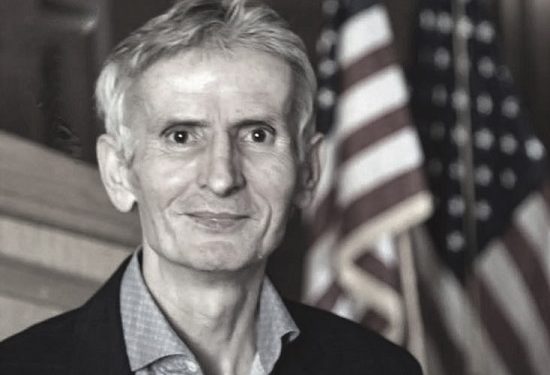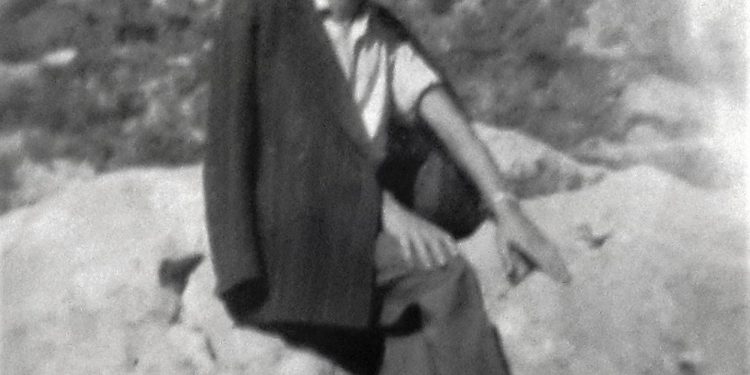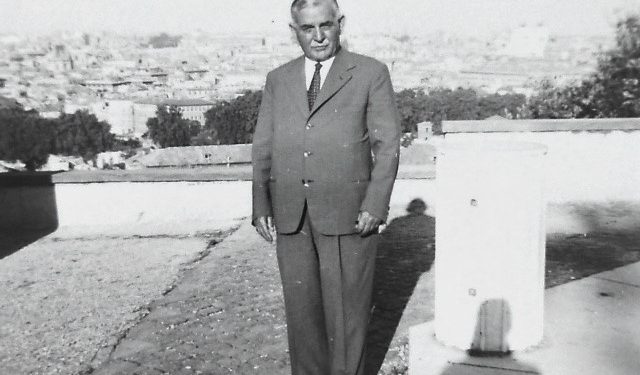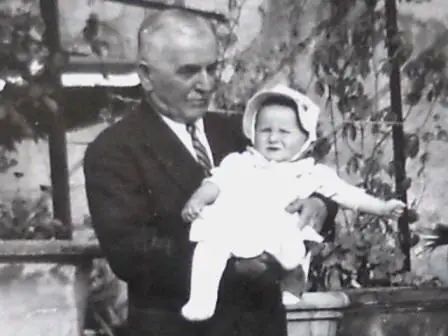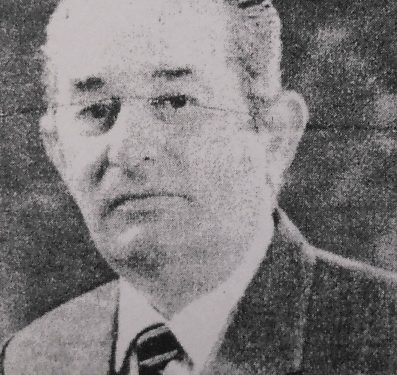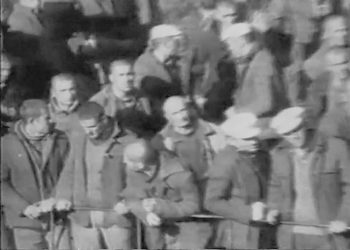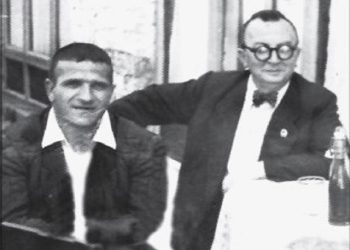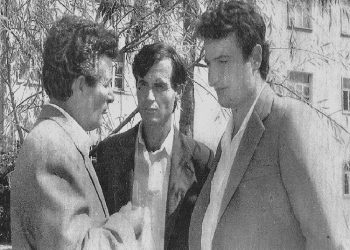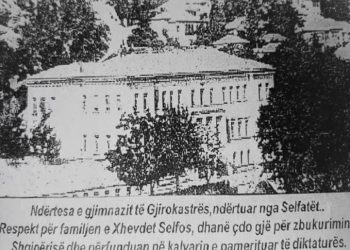By Beqir Sina
– When the well-known publicist and journalist of “Voice of America” wrote about the death of Kapidan Nikoll Gjon Markagjoni (Gjomarkaj), the last son of the well-known family of Dera e Gjomarkaje-
Memorie.al / In Queens – New York, on May 15, 2018, at the age of 90, Kapidan Nikoll Gjon Markagjoni (Gjomarkaj), the last scion of the well-known family of Dera e Gjomarkaj, known over the centuries as : Captains of Mirdita. This news greatly saddens his family members, friends, lovers, comrades-in-arms and co-sufferers from political prisons and internment camps in Albania, from where Nikolla is also the last son of Gjon Marka Gjon, but who also spent a lifetime with these people. Kapidan Nikoll Gjon Markagjoni (Gjomarkaj), passed away, surrounded by his wife, three children and close family members in his home, where he lived for years in Queens – New York.
For two days in a row, his family members, friends and well-wishers, along with dozens of compatriots, paid their respects at Fox Funeral Home (Thursday and Friday, May 17 and 18, 2018).
On Saturday, a procession was held at the Church “Our Lady Queens of Martyrs” in Forest Hills, Queens NY, which was led by the well-known priest, Dom Pjetër Popaj, of the Albanian Catholic Church “Our Lady of Shkodra”.
The coffin covered with the red and black flag with two proud vultures with the body of the deceased, with all honors, was buried on Saturday in Mount St. Cemetery. Mary Cemetery Flushing, Queen County, New York, bidding a final farewell to this last scion of the well-known Dera s Gjomarkaj family, known over the centuries as the Captains of Mirdita.
The entire procession and funeral ceremony were led by the close family members of Kapedan, as well as the great friend of this family, Tom Mrijaj:
In the commemorative speech, the former journalist of “Voice of America”, Gjek Gjonlekaj, a friend of this family, which has published in English and Albanian, the book “Kanuni i Lekë Dukagjini” (published by the publishing house: “Gjonlekaj Publishing Company”, New York, in 1989), said that he had come to say two words because he could not stay without saying on this day the word for all the family, friends and lovers of this great family of Mirdi, with national traditions – that is, in the mortuary of Kapidan Nikoll Gjon Markagjoni (Gjomarkaj).
“Because, I had it as a moral obligation of my special ties with this family from several decades in exile, because my ties with this family began exactly when I published the ‘Kanunin e Lekë Dukagjini’, Albanian – English, almost thirty years,” he said.
Mr. Gjonlekaj, who has a long activity with the Albanian community, recalled during his speech that he had always had meetings with Nikolla, and he always told them with great love and passion about the “Canon” of Lekë Dukagjini.
“In fact, he said, – Captain – Nicholas, – told me many things that I personally had not heard before, despite the fact that I was also the publisher of this book in America, and I was very involved with this work in its publication. And, I think that even researchers and scholars from institutes and universities who have organized conferences about the study of the Canon of Lekë Dukagjin, I am convinced that they did not know as much as the Captain of Mirdita, how much knowledge he had, which is not written about Canon”.
“The canon of Lëkë Dukagjin”, said the publisher of this book, in both English and Albanian, contains almost 30 separate chapters, which are directly related to the house of Gjon Marka Gjon, “The canon says: “The door of Gjon Marku, is the cornerstone of the Canon, which in English means that the House of Gjon Markaj was The home-stone Code of Lek Dukagjini”.
So, here it is about the importance that this house has had in the interpretation of Albanian laws and customs and various judicial decisions, which today can be seen as a “Supreme Court” of all the northern parts of Albania at that time, when there was no constitution, when there was no written law and the moral code of people everywhere in the world was operating.
“What does it mean that; all this long history belongs to this great family with an almost 600-year lineage which, at that time, was a dynasty or principality that expanded into many Albanian territories, in the north of Albania? What stands out for everyone is her name MIRDITE, or the baptism with this beautiful and beloved name, the most beautiful name in the whole globe, which cannot be found anywhere on the planet, ours is a place called “Good Day ” or “as we say in Albanian “Mirëdita”.
Next, Gjonleka tells something that he called very interesting: “There was a graduation ceremony in 2003, where coincidence, that is, my daughter Theresa Gjonlekaj, graduated from Hunter College – New York, in the same college with a Gjonmarkaj. As I was looking at the list of names of those graduating that day, in the brochure of this College, in the alphabetical order of the last name, I immediately noticed a name I had heard, it was exactly Mark Gjonmarku, who was graduating that day at Hunter College, on the same day with my daughter Theresa GjonLekaj”.
“And, of course, my mind immediately goes to Mirdita’s large family, that of Captain Gjonmarkaj, who was one of the main figures of this province and all of Albania, the protection of Albanian lands, and in the fight against communism”, said Gjonlekaj.
Then, during his speech, Gjonlekaj spoke about the contribution and struggle that this family and the great families of the north have made for the National Union. “Despite the fact that Albania and the Albanian territories were under the Italian occupation, – says Gjonlekaj, – it must be shown that many Albanians fought and worked for this union, even at that time, of the occupation, seeking and fighting only for Ethnic Albania”.
“So, – he emphasizes – these were Albanian patriots and patriots, who for the first time after many decades of invasions and reconquests, since the Ottoman Empire, the Serbs and Greeks of the Albanian lands, fought with weapons in hand against the invaders, and for the unification of all Albanian ethnic lands in the Balkans”.
“Also, in the conditions of the Italian occupation, it was the nationalists who fought for Albania and their fight was a success of that time, which was carried out by Gjon Markagjoni, Col. Bib Mirakaj, Mustafa Kruja, and many others. Even though the researchers and historians of Albania have questioned this period, it would be a success for these true nationalists and the most glorious period of these patriots and patriots”, said Gjonlekaj.
Calling them patriots and patriots who are the second generation most dedicated to the Albanian cause, after our national renaissance, when the Albanian state was created.
“So, – it was in the tradition of Mirdita, – said Gjonlekaj, – to give me such patriot and ardent patriot men. And, in particular, the Markagjoni Tower will stand out over the centuries, where many well-known personalities of the national issue have emerged from among this family. Where the penultimate one was Gjon Marka Gjoni, who is also mentioned in Col. Bib Mirakaj’s book, “Stand of a Nation”, as he says: “The last anti-communist stand, which could also be called the epic of Gjon Marka Gjoni”.
“Which, according to me,” he said, “proves and shows with deeds that the Door of Markagjonavje to the Captains of Mirdita, was a well-known door of sworn anti-communists, their center, and the root of those members of this family, or the imprisonment and exile in the prisons and the terrible arrests of Enver Hoxha, for a free and democratic Albania, without the star of communism on his head, as was their son, quite young. Mark Gjon Marku, who was killed in the war with the communist squads.
For whom the well-known poet Ernest Koliqi also wrote, who dedicated a poem – an elegy to him and Ndoc Miraka, poems that can be considered as the two most beautiful poems of Albanian literature.
However, I would like to say that: “These families continue to preserve their tradition in person. The family of Gjon Markaj, today has 25 members, which, we hope, will one day return to their homeland and give their contribution as little as their forefathers”.
The priest, Dom Pjetër Popaj – who performed the prayer and blessing, also spoke for the deceased. Captain Nikoll Gjonmarkaj, in his last farewell, who died, at the age of 90, as the last member of the well-known family of Dera e Gjomarkaj, known over the centuries as the Captains of Mirdita.
“In Orosh of Mirdita, at the Door of Kapidan, Gjon Marka Gjoni, the children were born: Marku, Ndoja, Lleshi, Deda and Nikolla, as well as Dava, Gjela, Marta, Dila and the youngest Bardha, they were born between the fires of Orosh in Mirdita, who was not defeated even by the torture of the communist regime, spending years in prison and exile, in prisons and internment camps under the communist dictatorship in Albania”, said Dom Pjetër Popaj, giving a special tribute to this family.
As a close friend of this family and the leader of this procession, the General Secretary of the Third Albanian League of Prizren in the USA, researcher and publicist, Tomë Mrijaj – author of several books, including the one about the well-known Dera family, also spoke of Gjomarkaj, known over the centuries as the Captains of Mirdita.
Miraj, on behalf of the family, gave a special thank you to all the participants in this funeral ceremony and the burial of Kapidan Nikoll Gjon Markagjoni (Gjomarkaj), that is, the honors he paid you for two days and the participation in the funeral.
Also, let him read the telegrams of condolence sent by the president of the League of Prizren on her behalf, Mr. Ismet Berisha.
The condolence telegram of the Association of Albanian Intellectuals “Trojet e Arbri”, on the occasion of the death of Captain Nikollë Gjomarkaj, and messages of condolence from the Archbishop of Tivari, Rrok Gjolleshaj, Don Anton Kçira, Don Nike Ukgjini, gentlemen, Mergim Korca, Paul Tedeschini, Sami Repishti and others.
Who was Captain Nikoll Markagjoni?
Captain Nikoll Gjon Markagjoni (Gjomarkaj) was born in Orosh, Mirdita, in 1928. Nikoll was 17 years old when, together with other family members, women and children, in 1945 they were interned in the camp in Berat. After the camp in Berat, this family was transferred to other forced labor camps in Albania.
They were in the camp: Uznoves – Kuçovos today, in the district of Berat; Shijakut; Valias Tirana, and then in the infamous camp Turan – Tepelen and then the mountain villages in the district of Gramsh and in Elbasan, Maliq – Korçë, Delvinë, Porto Palermo – Himarë, the marshes of Vlora, and Lushnje.
While some members of this family spent over 45 years in the prisons of Enver Hoxha, the prison of Burrel and the Spaçi of Mirdita.
He himself worked for several years under terrible conditions and inhumane torture in forced labor camps, together with many members of large and nationalist Albanian families, including my family, who have been in all these prisons and internment camps.
In April 1945, the family of Kapidan of Mirdita was arrested and kept in the house of Mr. Guljem Luka in Shkodër. This house was located across the street from Gjon Markagjon’s house, their family home, which was confiscated and turned into the central command of the State Security. Guljem Luka’s house turned into a real prison with surrounding walls and police guards.
From there, in June 1945, the members of this family were tortured together with other families who brought them from villages deep in the north. At first, those from Shkodra were interned in the camp of Berat, while they were sent to work in the fields of Uznova and Kuçova, in the collection of locusts which had spread in large numbers and damaged the agricultural crops at that time.
According to the memories of Jonuz Ndreu, it is said that in May 1949, Nikola with 9 friends from Dibra, escaped from the Turhan camp in Tepelena, clashing with weapons through the harsh mountains of this province, with the forces of the Army and Security where three of them were caught. While, the other six, deviated and headed for the border in the direction of the former Yugoslavia, and entered Yugoslavia on the Macedonian side.
They ran away from “the rain and fell into the hail”, because a former servant of the Yugoslav UDB, in the area where they crossed the border, named Mustafa Leshi, from Dibra e Madhe, who happened to be a relative of Haxhi Leshi , deliver them to the Serbian barracks, speeding up the procedure, to bring them back through the Yugoslav police. So Mustafa Lleshi, with the help of the Serbian bosses he served, tried to return the 6 fugitives, including Nikollë Gjonmarkaj, to the Albanian border forces.
But, as Jonz Ndreu, who was among these fugitives, fortunately, they did not surrender to the Albanian forces at the border because someone did not believe the statements made by Mustafa Lleshi about the six.
They were released and after a clandestine stay with some of his friends from Dibra, Nicholas, the sixth himself, returned again to the border but this time to Italy, finally being accepted as political refugees in Italy, where he spent together with other members of his family, several years there.
Among the friends who fled with Nikola, were: Abdullah Kaloshi, Jelal Dine, who no longer live and Jonuz Ndreu, who lives in the north of New York.
Nikola, according to the confessions, stayed seven years in Yugoslavia, where he enjoyed the respect of Albanian nationalist immigrants, who were aware of the sacrifices his family had suffered under the communist regime.
In November 1956, in Italy, he joined his father, Gjon Marka Gjoni and Brother Ndue Gjomarku. During his exile in the West, Nikoll Gjomarku held prominent press positions within the political party “Independent National Bloc”, founded by his father, Gjon Marka Gjoni, and older brother Ndue Gjomarku.
Nikolli returned to Albania after the fall of communism in 1994 and joined his surviving brother, Deda, and Sisters Marta and Bardha, along with his young grandson Gjon Mark Gjomarkaj and Kristina and Çelestina Markagjoni whom he met for the first time, after his daring escape. He joined them in their family home in Shkodër, in what is called “Kulla e Gjonmarkaj”. Nikol was married and has three children; Mark, Alex and Anna Maria. The whole family currently lives in New York. Memorie.al





